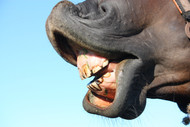Five Steps To Improving Your Horses Dental Health
Posted by Scone Equine Hospital on 2nd Apr 2019
1. GET REGULAR!
Regular dental examinations are key to maintaining a healthy mouth. Horses teeth continue to grow throughout the horses life to compensate for the high degree of wear of abrasive fibrous food material. Also a horse’s lower jaw is narrower than its upper jaw so as the horse grinds its food and the teeth continue to erupt and be worn down sharp enamel points on the outside of the upper molars and the inside of the lower molars are created. These sharp enamel points can lead to ulceration in the cheeks and tongue, leading to oral discomfort when eating and when ridden. If these are not treated, they can be the precursor to more serious dental conditions. A thorough oral examination performed by a veterinarian allows dental problems to be identified while they are still in the early stages, decreasing the possibility of more severe progressive dental conditions which may lead to other serious health issues for your horse.
2. KNOW YOUR HORSE.
As a minimum, all horses should receive an annual dental examination. Young horses may require more frequent dental examinations, as there are extraordinary amounts of dental changes occurring during the first 4-5 years of a horse’s life. If complex problems are found in any horse during the examination, some may require multiple treatments to correct the abnormality without damaging the teeth and more frequent visits. Senior horses (20 years of age or older) have an increased risk of periodontal disease, tooth attrition and loss often complicated by medical conditions such as Cushing’s disease. Twice-a-year examinations are often required to keep the teeth of senior horses functioning correctly. Your veterinarian will be best placed to advise you on the frequency of dental examinations for your horse.
3. GET FAMILIAR WITH SIGNS & SYMPTOMS
Some common signs of oral discomfort include dropping feed from the mouth while eating or balling feed in the cheeks. The horse may take longer to eat, avoid certain feeds or stop eating altogether resulting in weight loss. Some may exhibit excess salivation and/or oral odour. If ridden the horse may fight or avoid contact of the bit. However it is important to remember that horses are a prey species and generally will not show a weakness until it is unavoidable. Equine veterinarians skilled in dentistry are constantly amazed at how much discomfort horses endure without showing any outward signs to their owners. By the time many owners notice a problem, the issues inside the mouth are often severe.
4. KNOW THE IMPORTANCE OF USING A VET
Only a veterinarian has the medical, anatomical and physiological knowledge to diagnose and treat dental problems and to understand the effects that dental problems can have on the overall health of your horse. Veterinarians are the only people who can legally sedate your horse, provide adequate pain relief during potentially painful procedures (such as extraction) and to treat any concurrent medical conditions that may be affecting your horse. Veterinarians are able to assess the overall health of your horse before they are sedated or medicated to ensure that the medications given are the safest and most appropriate for your horse.
5. UNDERSTAND THE BENEFITS OF SEDATION
To complete a thorough oral exam, sedation is essential. It allows all structures to be examined properly and allows the horse (and owners!) to relax. It also provides pain relief if painful procedures, such as extractions, are performed. Once sedated, the veterinarian can then perform a thorough exam, including examination of the chewing muscles, bones of the skull, salivary glands and lymph nodes, as well as the range of jaw movement. The nostrils are also checked for discharge and the forehead may be tapped to check for fluid in the sinuses. The inside of the mouth can then be examined visually with a powerful light & by palpation, feeling for any abnormalities. All findings are recorded on a dental chart and if further diagnostic tests are required such as x-rays or blood tests, then your veterinarian can also perform these. A veterinarian also understands the importance of biosecurity and is trained in how to prevent the spread of infectious diseases between horses and properties.
As with most equine ailments, prevention is always better than a cure. If in doubt, always phone your veterinarian for advice.

